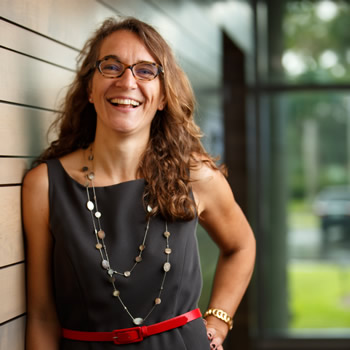Prof. Katrin KarbsteinBy Prof. Carla Oliveira  Dr. Katrin Karbstein is Professor of Integrative Structural and Computational Biology at The Scripps Research Institute, Florida, and an HHMI Faculty Scholar. Her group uses a combination of approaches that include biochemistry, genetics, and structural biology to get insight into the function of individual factors involved in the maturation of the 40S ribosomal subunit and its quality control. Currently, her lab is interested in learning how defects in ribosome assembly can lead to diseases. Dr. Karbstein became fascinated by RNA biology as a college student at Witten/Herdecke University in Germany, where she took classes from none other than Prof. Wolfgang Wintermeyer. “Obviously, his passion for ribosomes was contagious,” she recalled. She moved to the USA to complete the research for her Diploma thesis and ultimately stayed at Stanford to do her Ph.D. in Dr. Dan Herschlag’s lab, where she worked on ribozyme catalysis. It was early in her Ph.D., in a conversation with Dr. Olke Uhlenbeck, when she learned that “most of the DEAD-box ATPases – often referred to as RNA helicases - were not involved in splicing, as I had then thought, but in ribosome assembly.” This directed her interest to ribosome assembly, and so for her postdoc she looked for labs that took a biochemical approach, and found an open and supportive mentor in Jennifer Doudna. It was here that she started to work on ribosome assembly.
Considering the role of her mentors in her career, she indicated that the most important thing was the training she received. She explained, “I was very lucky to have been able to train with some of the best in our field, who have taught me very complementary things.” On the flip side, she recommends that current trainees “find something you love; and create a unique niche for yourself; either by addressing a novel question (this can be hard as a junior person), or by bringing a unique perspective or skill to the problem.” When asked about how to overcome the challenges people might encounter in their career, she said “some people encounter something terrible in their lives that at once seems to upend all their life plans; luckily, I have “only” encountered the challenges that life brings most of us, especially women: juggling children and family with your career, being a single parent, worrying about running out of funding for your lab. In my opinion, you overcome this by focusing on today and the next step; otherwise, things can become overwhelming.” She then added, “the other thing is to focus on the things that you have: happy, healthy children, a home, health insurance and friends, terrific people in your lab, great colleagues, whatever else you can put into that box”. Dr. Karbstein is a long-time member of the society and a frequent attendee to the RNA Meetings. “The RNA Society is a great community and makes a real effort in promoting young people at all stages of their career.” She added, “where else can a second year PhD student give a talk in front of 1000 people?” But she wouldn’t share her favorite story from the annual RNA Society meetings — instead she replied, ““hahaha, I cannot put that here...” Dr. Karbstein’s response to the question of her favorite RNA was “Is that a trick question???? 18S rRNA!” Although she is a “somewhat irregular tweeter,” Dr. Karbstein can be found on twitter at @KarbsteinL. |
